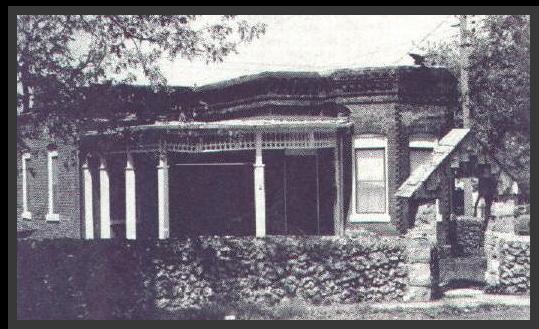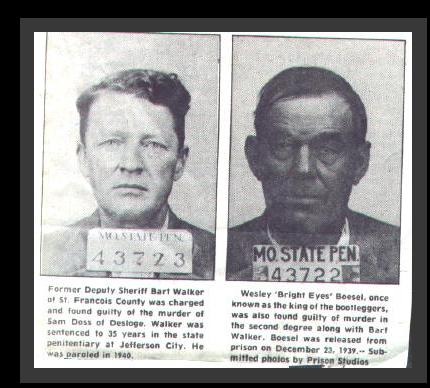
(Photo of actual house in which murder occurred.)
PREVIOUS PAGE

On the night of August 16, 1926, Sam Doss was gunned down in the kitchen of his home on Main Street in Desloge. Having just finished supper with his wife, he stood from the table, and turned to wipe his hands on a towel hanging beside the doorway. He never made it...multiple shotgun blasts ripped through the window of the kitchen, blazing from the darkness beyond the now shattered glass. Seven deer slugs ripped through the head and body of Sam Doss, and as he callapsed in a pool of blood at his wife's feet, perhaps the most controversial lawman in the history of St. Francois County went to meet his maker.
The controversy surrounding who had been responsible for the violent assassination of Doss became a raging question which would endure for five years...but Sam Doss was no stranger to controversy...for twenty of his last sixty-two years, he had served as a lawman in St. Francois County...he was a strapping six footer who packed a .45 revolver in his belt, and according to legend, used it to box the jaws of badmen he had been sent to arrest, primarily for the purpose of gaining their attention.
But Doss had not always been on the badgeholding side of the law. As a young man, in 1894, he became involved in a footrace swindle at a county fair in Murphysboro, Illinois. A common scam of the day, a promoter would organize a contest, hawk bets among the locals, and make off with the stakes. Doss fled with the stakes, and was later arrested in Missouri. He was convicted, and sentenced to five years in jail.
After serving three years of the sentence, Doss was pardoned, and moved to Cantwell, Missouri, near Desloge. For years, he ran a saloon and gambling hall, but in middle age, Sam Doss apparently changed his ways.
He married a girl from a family of high reputation, joined the Methodist Church, left the saloon and gambling business, and became a vehement prohibitionist. Sam got a job as a deputy sheriff for a few years, then took a position as a payroll guard with most powerful organization in this area. The National Lead Company.
During this time, Doss built his reputation as one of the toughest men in the county. Stories of his strength, ferocity and fearlessness spread across the state, and when peace officers in other parts of the area were planning the arrest of a particularly dangerous individual, they would often call Doss for assistance. "Send for Sam Doss" became a popular phrase throughout the area when a particularly tough job had to be handled.
Doss had a reputation for taking men alive, though apparently somewhat the worse for wear, if they failed to see things Sam's way. He only killed one man during his life, a man who had attempted to cut his throat at a July 4 picnic. Doss was tried for the murder and found not guilty on grounds of self defense.
In 1922, Doss was elected Constable of Randolph Township. Running on the Democratic ticket, Doss won the election by a comfortable majority. But when he attempted to beat H. B. "Bud" Watts for the Sheriff's election of 1924, he was unsuccessful.
Apparently part of this defeat came as a result of his opposition to the Klu Klux Klan, which was at that time a very strong organization in the county. A second factor which probably led to his defeat was the placing of hundreds of posters throughout the county which bore a photograph of Doss in a convict's uniform, a poltergeist of his youth which returned to haunt him.
But perhaps the greatest enemies of Sam Doss during this election were the bootleggers. During the roaring twenties, the illicit liquor trade in the county was booming, and the man who is remembered as the kingpin of the moonshiners is also known as one of Doss's most hated rivals...Wesley 'Bright Eyes' Boesel.
Boesel made no secret that he was the king of the local bootleggers, and controlled virtually all of the manufacture and distribution of illicit liquor in the county. Rival whiskey runners were often robbed of their cargo by Boesel, who in turn sold the booze to his own bootleggers.
Doss's war on illegal liquor in the area brought a new ferocity to the crime scene in St. Francois County. Unimpressed with his former opponent, Sheriff Bud Watts', efforts against the illegal liquor trade, Doss summoned a squad of federal agents from St. Louis, and carried out a series of raids on local moonshine operations that dwarfed the county officials' efforts.
Rumors of revenge were circulated by the moonshiners, especially Bright Eyes Boesel. In September [sic], 1926, just before the August Primary Election, Sam Doss, still employed as a payroll guard, was nominated for constable. His campaign against the moonshiners, a popular political issue, increased. After the night of August 16th, he was no more.
In the investigation of the death of Sam Doss, Sheriff Bud Watts compiled a list of more than 50 suspects whom he felt had sufficient reason to send the renegade lawman to the hereafter...but as the investigation continued, suspicion began to center on two men...Bright Eyes Boesel, and Deputy Sheriff Bart Walker. An informant in the case revealed that he had overheard the two suspects talking about the liquor raids, and that Doss would have to be shot.
Within a week, both of the men had been arrested, and Walker dismissed as a deputy. A preliminary hearing was held before a justice of the peace, and considerable evidence was produced. The theory of the prosecuting attorney handling the case was to prove that the two had been at the murder scene. This attempt was smashed when both men presented iron-clad alibies in the form of upstanding local citizens who indicated that they had either seen or been talking to the two in Flat River, over two miles away, at the time the shooting took place.
Local convictions among the populace that the two were responsible brought protests as they were released from custody. Sheriff Bud Watts declined an offer from the St. Louis Police Department for assistance in the investigation. Meetings were held by locals who voiced their indignation over the situation, but no further arrests were made in the case.
For four years, the controversy over who actually killed Sam Doss was one of the hottest topics in the Mineral Area. The case remained on the books as an unsolved murder. In 1928, two new candidates tossed their hats in the ring for the sheriff's race...Republican Bill London defeated Democratic candidate Roy Presnell.
Slightly more than a year after winning the election, Sheriff London was killed by an insane farmer, and a special election was held to fill his position. Roy Presnell was elected by a substantial majority.
One of Presnell's campaign promises was that he would clear up the case surrounding the murder of Sam Doss. A week after the election, the investigation was again opened. Presnell had two close allies in his effort, St. Francois County Prosecuting Attorney Harry O. Smith, and another attorney, Charles M. Hay, of St. Louis, who had been retained by Doss's widow.
Almost five years after a savage hail of deer slugs claimed the life of Sam Doss, the first major break in the case developed in the form of a deathbed confession.
Melvin Williams, a Lead Belt resident notorious for his association with the bootleggers and other malcontents in the area, died following an operation, possibly for a stab wound he had received. Officers learned that just before he died, Williams had "gotten religion," and had summoned his brother, Alfred, to his bedside. The dying man confessed to his brother that he had "something terrible" to get off his conscience.
Alfred informed police that his brother told him that he and a second brother, Charles, had been hired to kill Doss by Bright Eyes Boesel, and former deputy Bart Walker. He confessed that the two had paid the brothers $500 to go to the Doss home and do the shooting, while they went to Flat River to establish an alibi in case they should come under suspicion.
The dying man urged that his brother and partner in the caper, Charles, be contacted to verify the story. At this time Charles was serving a 25 year sentence in the Oklahoma State Penitentiary for robbery. Armed with the confession, Sheriff Presnell and Prosecutor Smith went to the prison in McAlester, Oklahoma where Charles Williams was being held.
Williams, after being confronted by the two law enforcement officials, verified the death bed confession of his brother and recounted the savage details of the night of August 16, 1926...how they had driven to the home, he had let Melvin out to hide behind a stone fence surrounding the structure, and had then driven around the corner to wait for his brother after the grisly deed was accomplished. Charles agreed to take the stand on behalf of the prosecution.
Having heard rumors of the deathbed confession, Boesel and Walker fled from the area...but Sheriff Presnell and Prosecutor Smith were not easily thrown off the trail. Boesel was traced to a backwoods cabin near Centerville, Missouri, and with the help of postal officials, Walker was discovered in Laramie, Wyoming, where he was working as a brakeman for a Union Pacific branch line.

The two were returned to stand trial on April 21, 1931, and Charles Williams was brought in from the Oklahoma Penitentiary to testify against them. After deliberating for three hours, the jury returned a guilty verdict against the two men, and each was sentenced to 35 years in prison by Judge Robert I. Cope, of Poplar Bluff.
Although the two were sentenced in the killing of Sam Doss, rumors persist to this day about others in the area who may have been involved in plotting the murder, and went unpunished. Although those secrets were taken to the grave by those who may have been responsible, the controversy over that August night in 1926 still lingers over the legend of Sam Doss...half a century after a fateful hail of lead etched his mark in history.
[Additional Information: Samuel L. Doss was born March 5, 1868, and died August 16, 1926. He was married to Jennie B. Langdon, daughter of Ed and Mary Langdon. Jennie was born July 5, 1868, and died Sept. 19, 1941. They are both buried at Bismarck City Cemetery in Bismarck, Missouri.]
MORE ARTICLES RELATED TO THE LIFE AND TIMES OF SAM DOSS:
Otto Huitt Killed by Sam Doss, Farmington-Times, July 9, 1915.
Sam Doss Set Free By Jury In Killing of Otto Huitt, Bonne Terre
Star, Nov. 26, 1915.
Booze Joints and Gambling Dens Raided, Lead Belt News, Sept. 21,
1923.
Walker and Boesel Acquitted, Star News-Register, Sept. 24, 1924.
Obituary of Jennie (Mrs. Sam) Doss, Lead Belt News, Sept. 26,
1941.
In Memory of Sam Doss (a poem by Minnie Delona Hutchings)
Sam Doss -
Officer Down Memorial Page
The information on this site is provided free for the purpose of researching your genealogy. This material may be freely used by non-commercial entities, for your own research. The information contained in this site may not be copied to any other site without written "snail-mail" permission. If you wish to have a copy of a donor's material, you must have their permission. All information found on these pages is under copyright of Oklahoma Cemeteries. This is to protect any and all information donated. The original submitter or source of the information will retain their copyright. Unless otherwise stated, any donated material is given to MOGenWeb to make it available online.